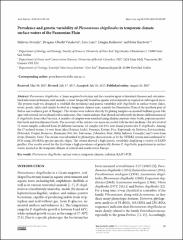| dc.description.abstract | Plesiomonas shigelloides, a Gram-negative bacterium and the causative agent of intestinal diseases and extraintestinal
infections in humans and animals, is most frequently found in aquatic environments in tropical or subtropical areas.
The present study was designed to establish the prevalence and genetic variability of P. shigelloides in surface waters (lakes,
rivers, ponds, inlets and canals) located in a temperate climate zone, namely the Pannonian Plain of the northern part of
Serbia and southern part of Hungary. The strains were isolated directly by plating samples on inositol-brilliant green-bile
agar with neutral red or phenol red as indicators. Our results indicate that phenol red effectively facilitates differentiation of
P. shigelloides from other bacteria. A number of samples were enriched using alkaline peptone water broth, peptone inositolbile
broth and tetrathionate broth. The recovery of the isolates was more successful with the first medium. Out of a total of
51 water samples collected from 28 different locations, 22 samples (43.1%) were found positive for P. shigelloides. Among
the 37 isolated strains, 34 were from lakes (Šatrinci, Ludaš, Panonija, Krivaja, Pecs, Kapetanski rit, Pavlovci, Kovácsszénája,
Dobrodol, Vranjaš, Borkovac, Hermann Ottó, Sot, Šelevrenac, Zobnatica, Palić, Orfüí, Jarkovci, Čonoplja) and 3 were from
rivers (Danube, Sava). The strains were identified by phenotypic characteristic or by the VITEK2 system and confirmed by
PCR using 23S rRNA species-specific oligos. The strains showed a high genetic variability, displaying a variety of RAPD
profiles. Our results reveal for the first time a high prevalence of genetically diverse P. shigelloides populations in surface
waters located in the temperate climate of central and southeastern Europe. | en_US |

